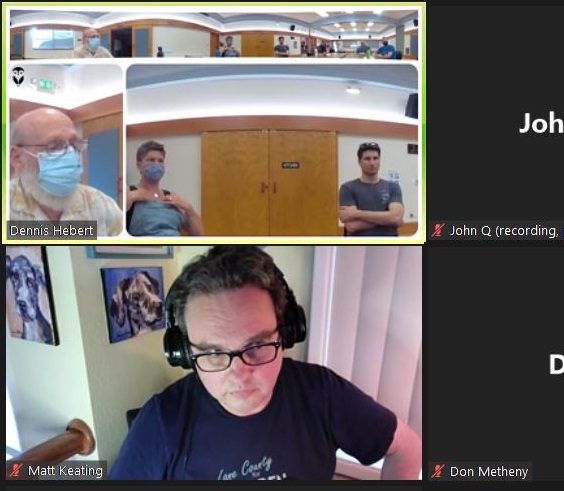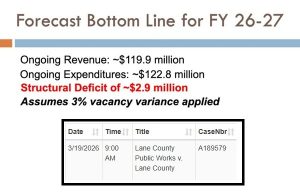Councilor: EPD, SPD police arrested Roe protesters to protect the public good
5 min read
Question Time for Eugene City Councilor Matt Keating. Chair of the Southeast Neighbors Human Rights Committee, Rob Fisette:
[00:00:07] Rob Fisette (SEN Human Rights): Our sister city Irkutsk in Russia: At the beginning of the invasion of Ukraine there was some sort of wanting to terminate or otherwise penalize them for their authoritarian acts, as it were, of arresting 10 protesters who were protesting the war.
[00:00:24] And when the Supreme Court removed the right to abortion, legalized forced birth in the United States, there was a protest in downtown Eugene in which 10 people were arrested for essentially what they called disorderly conduct, which if you were to actually read the articles, watch the videos, this amounts to standing in the street, having a foot in the street when they were asked to be on the sidewalk, which I guess I would describe as an authoritarian act.
[00:00:51] Since you didn’t seem to bring it up at the city budget meeting when EPD’s (Eugene Police Department) budget was raised by $10 million, I’m curious, you know, how it is that you square this? How it is that you think about these two things as somehow different?
[00:01:06] City Councilor Matt Keating: Looking up my conversation with the chief about this, and I’m happy to share with you Rob—and this team—the chief’s snapshot to council as to what unfolded the evening of those arrests.
[00:01:23] There’s nationwide an effort—the name of it escapes me, so I don’t want to speak out of turn—but there was an effort from extremists nationwide to wreak havoc at churches and pregnancy crisis centers, whatever you want to call them, and then blame leftists. ‘The Night of Rage,’ I think is what it was called.
[00:01:57] I suspect, and it’s my understanding, but I suspect that there was a semblance of that element here in Eugene because as night fell, what the chief described to us was a much different scenario than a peaceful protest that played out during the day. Folks were clad in all black: backpacks, masks, hoodies, aiming to really kind of sow discord and engage in some semblance of destruction.
[00:02:38] It’s a much different animal than an authoritarian government simply arresting persons for protesting a war than it is a municipality making arrests to protect public safety. And I hear your concern. From my vantage point, what the chief described to us seemed appropriate for EPD to take the actions they took.
[00:03:14] And those actions—we have two different trains of thought, that I don’t want to connect the budget to what happened, or to those particular arrests, those are two entirely different conversations. But I think it’s a little unfair to compare an authoritarian regime arresting persons for exercising their right to protest an unjust war versus a municipality that’s protecting the public good. That’s where I think I’ll leave it, but I think that those aren’t even apples and oranges. That’s just an unfair comparison.
[00:04:00] Rob Fisette (SEN Human Rights): So it sounded like, if the protestors of the (Ukraine) war (in Irkutsk) had showed up clad in black with backpacks and things of the nature that you described, then you wouldn’t have quite such a problem with what they did, is that it?
[00:04:12] City Councilor Matt Keating: Oh, I don’t want to answer any hypotheticals. I’ve made my comments publicly denouncing not only the aggression in Ukraine, but the authoritarian regime’s response to folks who were protesting the war. I think it was an appropriate action to ask for the city council to temporarily suspend our sister city relationship with Irkutsk.
[00:04:36] And it was even, the conversation has resurfaced when the president of Ukraine mentioned to the National Conference of Mayors his longing for all municipalities around this United States to essentially do what the City of Chicago did, by suspending, I believe Chicago’s sister city relationship was with Moscow, I could be wrong, but Chicago took the action that I was hoping that the City of Eugene would take. We did not at the time.
[00:05:10] But I think that there is a thirst among councilors to do so and I hope that we can engage in a sister city relationship with a community in Ukraine in the future. But I think that those (are the) appropriate actions and I would argue similarly in the future.
[00:05:34] Rob Fisette (SEN Human Rights): Is it your position that when the police department shows up and calls in the Springfield Police Department, who is currently being sued all different ways for civil rights violations as well, to brutalize and arrest people who have caused no damage, who have caused no violence, and arrest them, but it’s reasonable to simply ask the chief if he thinks it was okay, and if the chief says, ‘Listen, yeah, it was fine what we did,’ then, yes, that’s good enough for you?
[00:06:02] City Councilor Matt Keating: So I brought it with our police auditor, my concern I have with neighboring agencies operating within our boundaries who lack the accountability that the City of Eugene Police Department does in regards to community oversight. We as a city have no oversight over Springfield P.D. or a neighboring entity operating within our boundaries.
[00:06:32] That should change. If an agency is operating within our boundaries, we should have the same oversight as we do with our own law enforcement. And I’ll continue to advocate that point.
[00:06:46] Rob Fisette (SEN Human Rights): And that same oversight, by the way, is that the chief gets to decide in the end if anything happens or not.
[00:06:51] City Councilor Matt Keating: That’s a perspective, but we have a robust civilian review process and a political standard of police auditors in the nation. So, I’ll leave that there. And I’ll be happy to follow up with you all in regards to the chief’s description to council, so you can read unfiltered his account to us to help shape my thinking and my thoughts on the subject.
[00:07:24] John Q: Question Time for Councilor Keating at the Southeast Neighbors board meeting July 12. The sister city relationship with ‘the Paris of Siberia’ was established in the mid-1980s and signed by Mayor Brian Obie. The citizen diplomacy helped foster cultural exchanges.





